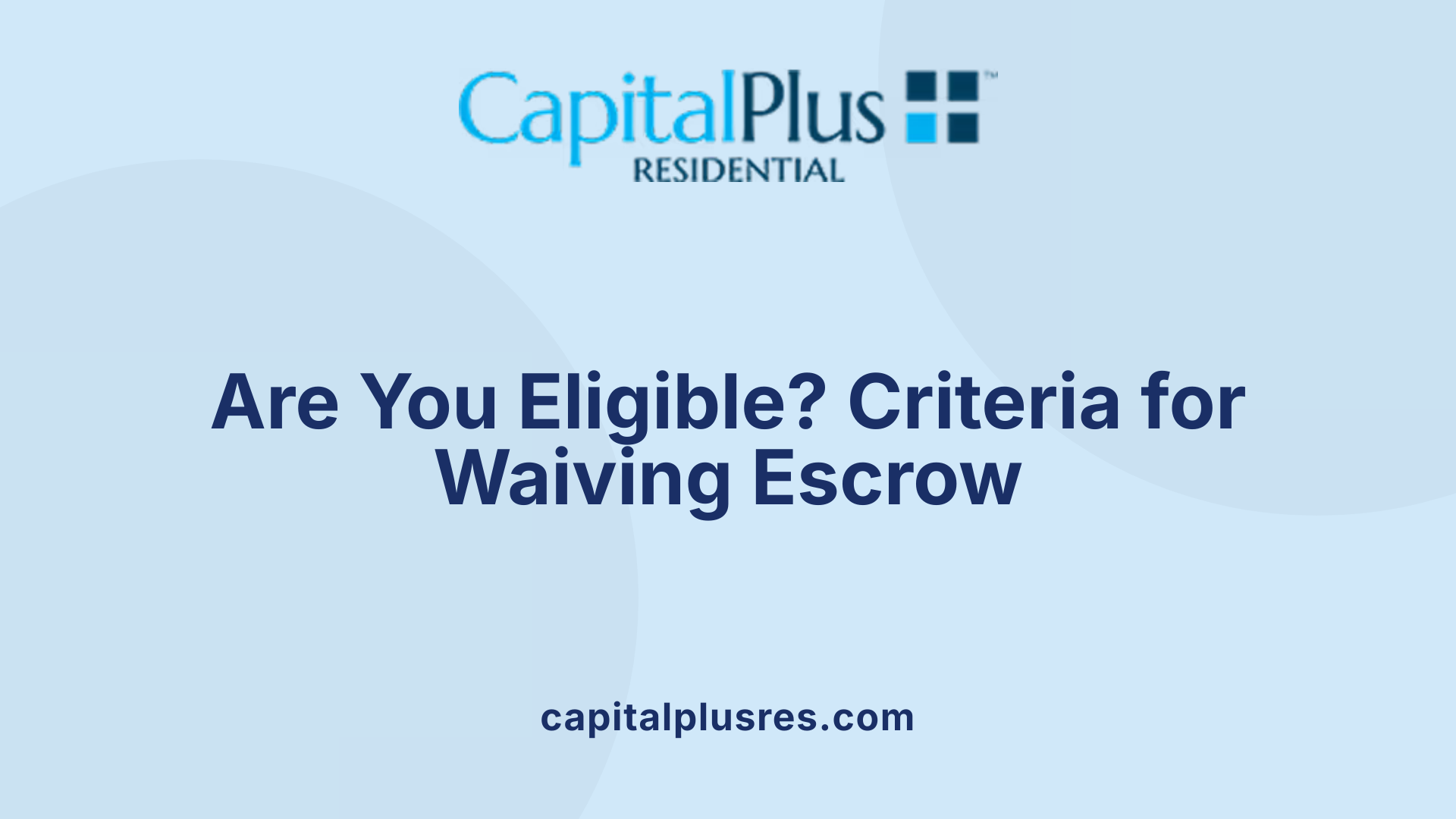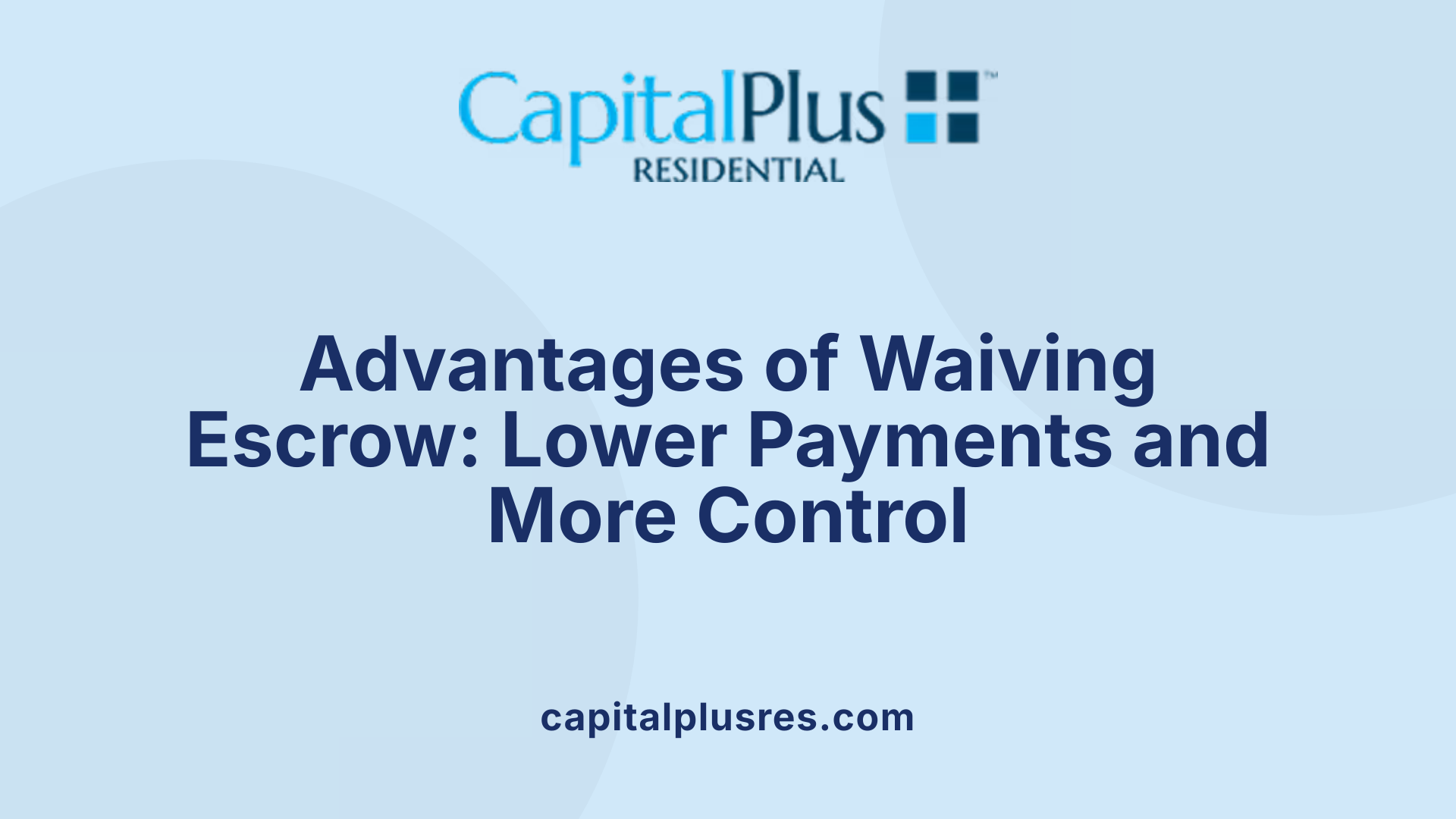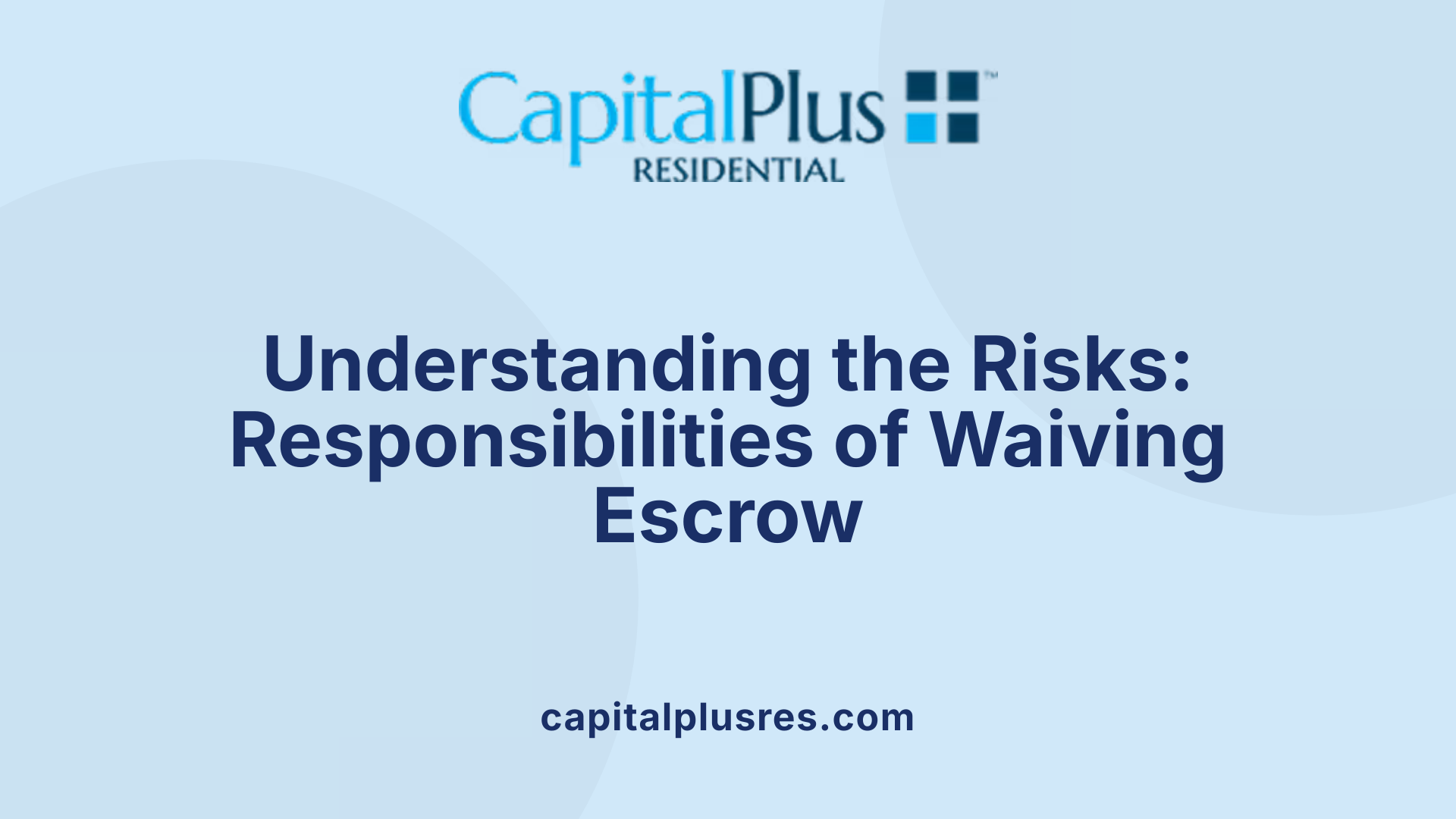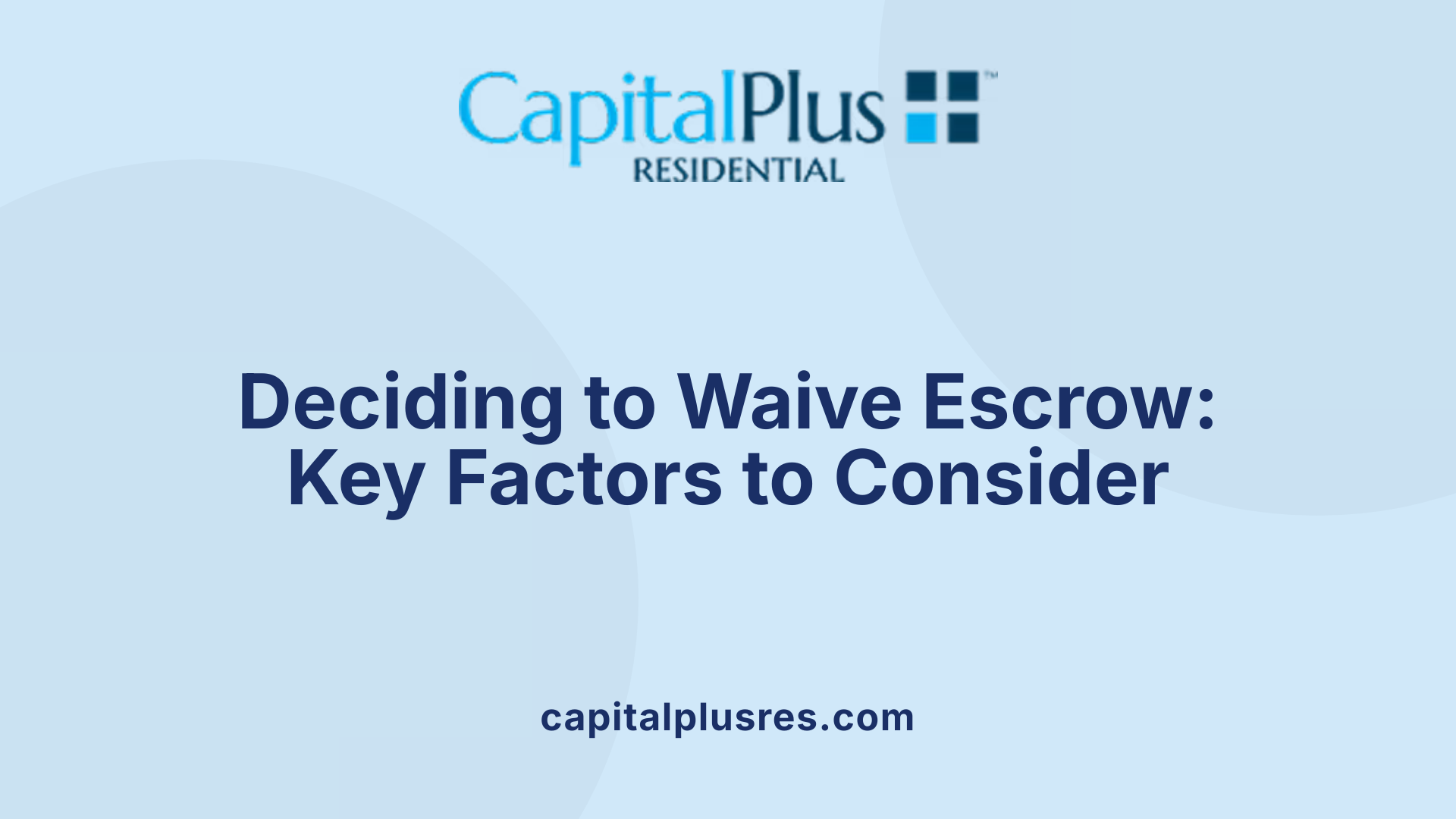Understanding Escrow in Mortgage Agreements
Escrow accounts are a standard element in many mortgage agreements, designed to safeguard both lenders and homeowners by managing payments for property taxes and homeowners insurance. However, some borrowers may consider waiving escrow to gain financial flexibility. This article explores when it makes sense to waive escrow in a mortgage agreement, the eligibility criteria, benefits, and potential risks involved.
What Is an Escrow Account and Its Purpose?
What is an escrow account in a mortgage?
An escrow account is a holding account used by lenders to collect and pay property taxes and homeowners insurance on behalf of the borrower to ensure these payments are made on time.
Definition of escrow in mortgages
In the context of mortgages, an escrow account is a neutral third-party account set up by lenders to manage the periodic payments for property taxes and homeowners insurance. Instead of the homeowner making these payments directly to the taxing authorities or insurance companies, the lender collects a portion of these costs each month as part of the mortgage payment and holds these funds in escrow.
Role of escrow accounts in paying property taxes and insurance
The lender uses the money in the escrow account to pay property taxes and homeowners insurance premiums when they come due. This arrangement ensures that these essential payments are made on time and prevents any lapse in coverage or property tax penalties.
Why lenders require escrow
Lenders require escrow accounts to protect their investment in the property. By managing the timely payment of property taxes and insurance, lenders avoid situations where unpaid taxes could lead to liens on the property or where lack of insurance could expose them to significant financial risks. This setup also provides convenience for homeowners by spreading these large annual or semi-annual expenses into manageable monthly payments.
Understanding Escrow Waivers and How They Affect Mortgages

What does waiving escrow mean?
Waiving escrow means that the homeowner chooses not to have an escrow account managed by the lender. Normally, an escrow account bundles property tax and homeowners insurance payments into the monthly mortgage payment. By waiving escrow, the borrower’s monthly mortgage payment decreases since these costs are no longer included and must be paid independently.
Financial implications of waiving escrow
Opting for an escrow waiver can offer financial flexibility. Without the escrow account, borrowers avoid the automatic addition of taxes and insurance costs to their mortgage payments, which lowers the monthly amount due. However, this also introduces an increased risk of missed payments. Since the borrower is responsible for directly paying property taxes and insurance premiums, any delays or failures to pay can result in serious penalties such as tax liens or insurance policy cancellations.
Borrower's responsibilities when escrow is waived
When an escrow waiver is in place, the borrower must stay vigilant about paying property taxes and insurance on time. Lenders typically require borrowers to have a solid payment history, good credit — often a minimum score of 620 — and sufficient home equity (usually at least 20%) before allowing a waiver. Additionally, there is usually a waiting period, often one year, before an existing loan’s escrow account can be waived. This ensures that the borrower has demonstrated the ability to manage these payments responsibly. Fannie Mae, Freddie Mac, and VA loans may permit waivers under specific conditions, while FHA loans generally do not allow escrow waivers.
Being proactive about these payments is crucial to avoid any penalties that come with late or missed tax and insurance bills. Therefore, waiving escrow suits homeowners comfortable managing their own payment schedules and looking to reduce their monthly mortgage expenses.
Eligibility Criteria: Who Can Waive Escrow?

Loan Types Allowing Escrow Waivers
Escrow waivers are not available for all loan types. Homeowners with Fannie Mae, Freddie Mac, or VA loans may be eligible to waive escrow accounts, but this depends on meeting specific conditions set by the lenders. Notably, FHA loans do not permit escrow waivers, so borrowers with these loans must maintain escrow.
Equity Requirements for Conventional Loans
For conventional loans, an important eligibility factor for waiving escrow is the amount of equity you have in your home. Borrowers generally need to have at least 20% equity, which means the loan-to-value (LTV) ratio must be 80% or less to qualify for an escrow waiver. This ensures the lender has sufficient collateral as security.
Credit Score Requirements
Creditworthiness is another critical consideration. Typically, a credit score of at least 620 is required to qualify for waiving escrow. This threshold can be especially significant for VA loans, where lenders place particular emphasis on the borrower’s credit profile.
Lender Review Process Including Payment History
Lenders also conduct a thorough review of the borrower’s payment history. They want to ensure that borrowers have managed their past payments responsibly without delinquencies or defaults. This assessment helps lenders feel confident that the borrower can handle paying property taxes and insurance premiums independently without jeopardizing timely payments.
Overall, eligibility to waive escrow depends on a combination of loan type, sufficient home equity, adequate credit score, and a proven track record of responsible payment behavior. Borrowers considering an escrow waiver should review these requirements carefully with their lender before making a decision.
Timing and Restrictions: When Can You Waive Escrow?
When can escrow accounts be waived or removed?
Lenders typically enforce a waiting period before allowing escrow accounts to be waived or removed from an existing loan. This waiting period is usually around one year but can extend up to five years depending on the loan type and lender policies.
During this time, borrowers must carefully manage their mortgage payments and demonstrate responsible financial behavior. Consistent, on-time payments are essential to show lenders that the borrower can handle the increased responsibility of paying property taxes and insurance directly.
Duration of waiting periods for different loan types
- Conventional loans: Often require a minimum one-year waiting period with at least 20% equity (loan-to-value ratio of 80% or less) before qualifying for an escrow waiver.
- VA loans: May also require good payment history and a credit score of at least 620, with waiting periods possibly extending longer depending on the lender.
- FHA loans: Generally do not allow escrow waivers, so waiting periods for removal typically do not apply.
Conditions to meet before opting out
Before opting out of escrow:
- Borrowers must meet equity requirements (usually 20% or higher).
- Maintain a satisfactory credit score, often 620 or above.
- Have a clean payment history without delinquencies or defaults on taxes and insurance.
Meeting these conditions helps lenders feel confident that borrowers can manage the responsibility of paying taxes and insurance on their own without risking penalties such as tax liens or insurance cancellations.
Benefits of Waiving Escrow Accounts

What are the benefits of waiving escrow?
Waiving an escrow account lets homeowners lower their monthly mortgage payments since they no longer contribute upfront for property taxes and insurance through the lender.
This reduction in monthly expenses provides increased financial flexibility, allowing homeowners to manage their cash flow better or allocate funds to other priorities.
Additionally, bypassing escrow means borrowers gain direct control over paying their property taxes and homeowner's insurance. They handle these payments on their own schedule, which can sometimes help in managing finances more effectively.
However, it's important to remember that with this control comes increased responsibility. Homeowners must ensure timely payments to avoid penalties like tax liens or insurance cancellation.
In summary, waiving escrow offers benefits mainly through lower monthly payments and greater financial freedom, but it requires careful management of tax and insurance bills.
Risks and Responsibilities When Waiving Escrow

What are the risks of waiving escrow?
Waiving an escrow account means the borrower takes on the responsibility of paying property taxes and homeowners insurance directly. This shift increases the risk of missed or late payments since these obligations are no longer automatically managed by the lender. Missed payments can lead to serious consequences such as tax liens placed on the property or cancellation of insurance policies.
Increased risk of missed payments
Without the structured monthly escrow payments, homeowners must be vigilant about budgeting and timing their payments. Forgetting or delaying these payments can lead to penalties or a lapse in coverage, which could expose the homeowner to financial risk if unexpected incidents occur.
Potential penalties such as tax liens or insurance cancellations
If property taxes are not paid on time, the local government can impose a tax lien, which gives them a legal claim against the property until the debt is settled. Similarly, failing to pay homeowners insurance premiums can lead to policy cancellation, leaving the property uninsured and the homeowner vulnerable to losses.
Importance of timely tax and insurance payments
Ensuring that taxes and insurance premiums are paid promptly is crucial to avoid these penalties. Homeowners who opt for an escrow waiver should have standard reminders and budgeting practices to meet these deadlines consistently. Responsible management protects the homeowner’s investment and maintains clear title to the property.
By understanding these risks, borrowers can weigh the benefits of financial flexibility against the increased responsibility and potential hazards involved in waiving escrow.
How Lenders Assess Borrower Readiness for Escrow Waiver
How do lenders determine if a borrower can waive escrow?
Lenders carefully evaluate several aspects of a borrower's financial behavior before approving an escrow waiver. A critical part of this assessment is reviewing the borrower's payment history. This helps lenders gauge if the borrower has consistently managed their mortgage and related expenses without missing payments or incurring penalties.
Creditworthiness plays another significant role. Generally, a credit score of at least 620 is desirable, particularly for VA loans, indicating that the borrower reliably handles debt. This score threshold aligns with lenders' efforts to minimize risk.
Besides these financial markers, lenders also look at the borrower's overall responsibility in managing large payments like property taxes and homeowners insurance. Since waiving escrow means the borrower pays these costs directly, lenders want assurance that taxes and insurance bills will be paid on time to avoid tax liens or insurance policy cancellations.
In summary, lenders assess whether borrowers have demonstrated financial reliability and responsibility through their payment history and credit profile. These evaluations help ensure the borrower can handle the extra responsibility of managing taxes and insurance without the protective oversight of an escrow account.
Making the Decision: When Should You Consider Waiving Escrow?

Factors to Weigh Before Waiving Escrow
Deciding to waive escrow requires careful consideration of both the benefits and responsibilities. Escrow accounts simplify the payment of property taxes and insurance by including these costs in monthly mortgage payments, but waiving escrow reduces those payments and puts the onus on the homeowner to pay taxes and insurance directly.
Assessing Financial Stability and Payment Discipline
Before opting out, evaluate your financial stability and ability to manage regular large payments. Lenders typically require an equity of at least 20% and a good credit score—usually a minimum of 620. Additionally, they review your payment history to ensure you have a track record of responsible financial management without delinquencies.
Loan Conditions and Personal Preferences
Eligibility for an escrow waiver depends on your loan type. Conventional loans, Fannie Mae, Freddie Mac, and VA loans may allow waivers under specific conditions, but FHA loans do not. Some loans even have waiting periods of up to five years before escrow can be removed. Personal preferences factor in as well: if you prefer lower monthly payments and can reliably track and pay taxes and insurance yourself, waiving escrow might be beneficial.
When Is it Advisable to Waive Escrow?
Waiving escrow can be advisable for financially disciplined borrowers who have at least 20% equity, maintain strong credit and payment histories, and seek the flexibility of lower monthly payments. These homeowners must also be diligent in making timely tax and insurance payments to avoid penalties such as tax liens or policy cancellations.
Balancing Flexibility and Responsibility in Escrow Waivers
Choosing to waive escrow in a mortgage agreement offers potential benefits such as lower monthly payments and increased financial control, but also imposes significant responsibility on the homeowner to manage property tax and insurance payments properly. Eligibility criteria, lender requirements, and timing restrictions all govern when and how escrow can be waived. Borrowers should carefully assess their financial stability, discipline, and loan specifics before deciding to waive escrow to avoid the risks of missed payments and penalties. Ultimately, waiving escrow is a decision that balances financial flexibility with the need for diligent money management.









